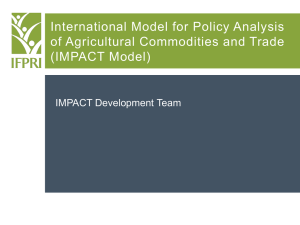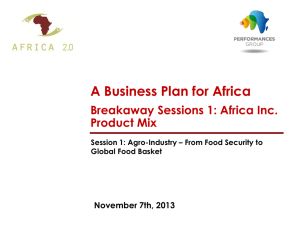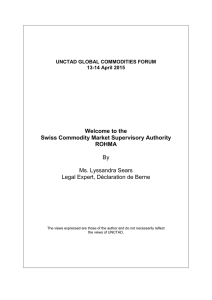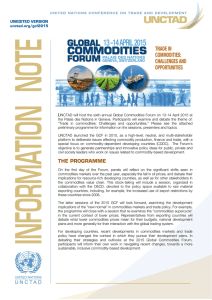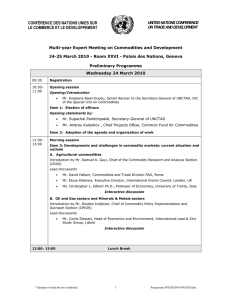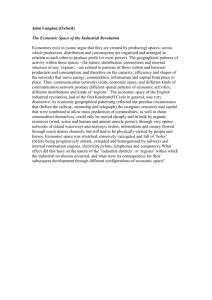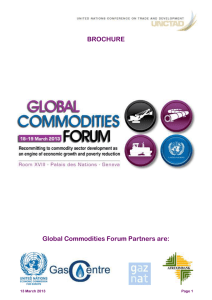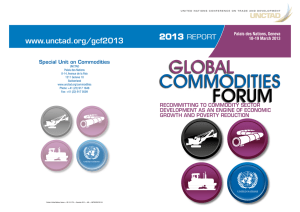Programme www.unctad.org/gcf2013
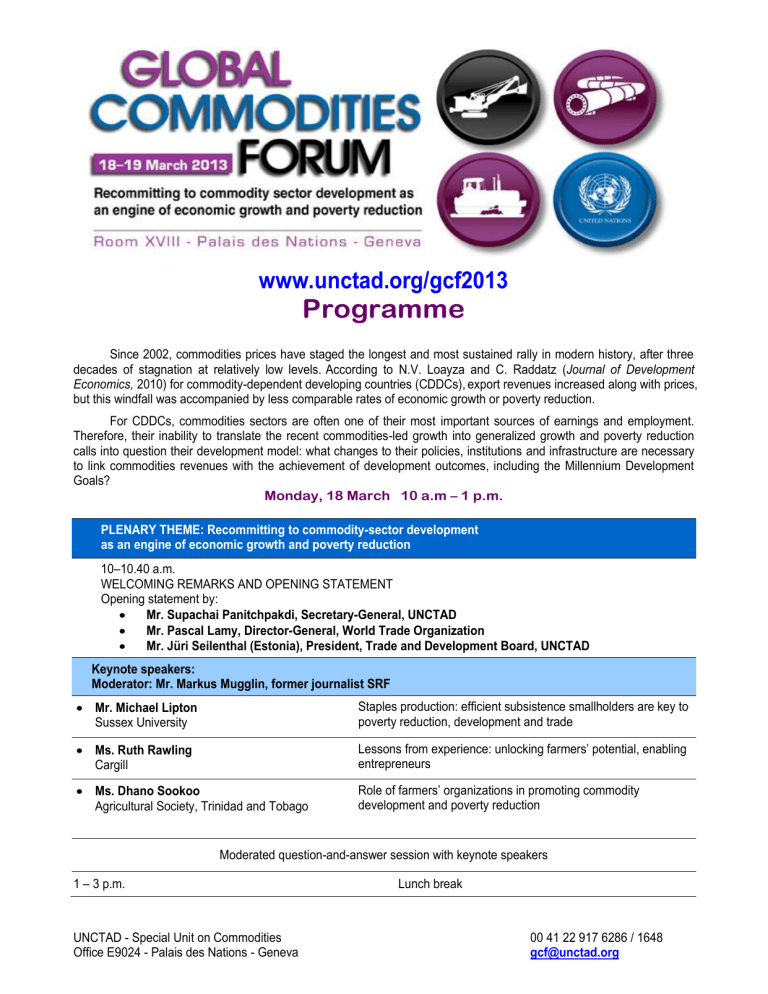
www.unctad.org/gcf2013
Programme
Since 2002, commodities prices have staged the longest and most sustained rally in modern history, after three decades of stagnation at relatively low levels.
According to N.V. Loayza and C. Raddatz ( Journal of Development
Economics, 2010) for commodity-dependent developing countries (CDDCs), export revenues increased along with prices, but this windfall was accompanied by less comparable rates of economic growth or poverty reduction.
For CDDCs, commodities sectors are often one of their most important sources of earnings and employment.
Therefore, their inability to translate the recent commodities-led growth into generalized growth and poverty reduction calls into question their development model: what changes to their policies, institutions and infrastructure are necessary to link commodities revenues with the achievement of development outcomes, including the Millennium Development
Goals?
Monday, 18 March 10 a.m – 1 p.m.
PLENARY THEME: Recommitting to commodity-sector development as an engine of economic growth and poverty reduction
10–10.40 a.m.
WELCOMING REMARKS AND OPENING STATEMENT
Opening statement by:
Mr. Supachai Panitchpakdi, Secretary-General, UNCTAD
Mr. Pascal Lamy, Director-General, World Trade Organization
Mr. Jüri Seilenthal (Estonia), President, Trade and Development Board, UNCTAD
Keynote speakers:
Moderator: Mr. Markus Mugglin, former journalist SRF
Mr. Michael Lipton
Sussex University
Staples production: efficient subsistence smallholders are key to poverty reduction, development and trade
Ms. Ruth Rawling
Cargill
Ms. Dhano Sookoo
Agricultural Society, Trinidad and Tobago
Lessons from experience: unlocking farmers’ potential, enabling entrepreneurs
Role of farmers’ organizations in promoting commodity development and poverty reduction
1 – 3 p.m.
Moderated question-and-answer session with keynote speakers
Lunch break
UNCTAD - Special Unit on Commodities
Office E9024 - Palais des Nations - Geneva
00 41 22 917 6286 / 1648 gcf@unctad.org
Global Commodities Forum
18-19 March 2013, Palais des Nations, Geneva
"The development of price-risk-management measures was also essential; governments could play an important role by implementing mechanisms that enable the private sector to use them." Mr. Guitchounts, economist at the International Cotton Advisory Committee, during GCF 2012.
Monday, 18 March 3 – 4.30 p.m.
Risk management and resilience: methods and mechanisms for developing countries and small producers to prosper in spite of price volatility in the commodities markets
Moderator: Mr. Jean-François Lambert, Global Head of Commodity and Structured Trade Finance,
HSBC Bank Plc
Managing commodity price instability. Why grains are different Mr. Franck Galtier
Centre de coopération internationale en recherche agronomique pour le développement
Dr. Sushil Mohan
School of Business
University of Dundee
Jean-François Casanova
Strategic Risk Management Paris
Delivering price-risk management services to commodity producers in developing countries: the case of coffee
Beyond derivatives, How to better manage risk exposures in commodity dependent countries
Mr. Bruce Tozer
Common Fund for Commodities Expert, Former
Managing Director, JP Morgan Environmental
Markets
Outcomes of the Public–Private Initiative on Commodity Market
Volatility
In developing countries, the renewed attention to agriculture in the public policy discourse has highlighted the dilapidated state of the institutions and infrastructure after two decades of relative neglect. Although the retreat of the
State in the 1980s and 1990s from participation in the sector was meant to create incentives for private actors to drive development, a void remained.
Monday, 18 March 4.30 – 6 p.m.
Playing catch-up in the agricultural sector: investing in neglected infrastructure and services in the agricultural sector; filling the void left by the elimination of parastatal institutions
Moderator: Mr. Atsen Ahua, journalist
Mr. Frank Deveer
Managing Director
Villa Development Company Limited Farms of Old Domeabra
Playing catch- up in the agricultural sector: Some practical problems from West Africa
Mr. Ebenezer Tei Quartey
Director
Research Department of Ghana Cocoa Board
Dr. Bharat Kulkarni
Stalwart Management Consultancy Services India
The role of parastatal institutions in the agricultural sector. the case of Ghana Cocoa Board
Attaining economic diversification and growth using commodity exchange in Malawi
6 p.m. – 7.30 p.m. Cocktail reception
Page 2
Global Commodities Forum
18-19 March 2013, Palais des Nations, Geneva
Ambassador Jones, Deputy Executive Director at the International Energy Agency, during GCF 2012, affirmed that several policy responses existed to deal with the many drivers of volatile prices: measures to ensure more stable markets, including increasing the transparency of physical and futures markets, and reducing market distortions by means of price liberalization and a level investment playing field.
Tuesday, 19 March 10 – 11.30 a.m.
BREAKOUT THEME: Information and transparency in the commodities sector
Challenges and solutions in collecting, analysing and disseminating market information and other commodities data
Moderator: Ms. Emma Farges, Journalist, Reuters
Mr. Daniel Asare-Kyei
Agriculturist and geo-information specialist, ESOKO
Mobile agriculture: providing tools and support for market information services and commodity price exchange
Mr. David Hallam
Director, Trade and Markets Division
Food and Agriculture Organization of the
United Nations
Mr. Shiwei Xu
Agricultural Information Institute of the Chinese
Academy of Agricultural Sciences, China
Enhancing international market transparency: the Agricultural
Market Information System
Enhancing agricultural market information: China's experience
Ms. Armelle Gruere
Statistician, Consultant
International Cotton Advisory Committee
United States of America
Public–private partnerships in meeting the challenges of data collection and dissemination in the cotton sector
According to a recent report by the World Bank, removing trade barriers, as well as enhancing market transparency and building resilience, can be used as possible entry points to an effective contribution of Africa to food self-sufficiency.
11.30 a.m.– 1 p.m.
BREAKOUT THEME: Information and transparency in the commodities sector
Improving transparency in commodities markets and value chains
Moderator: Ms. Emma Farges, Journalist, Reuters
Mr. Stéphane. Graber
General Secretary
Geneva Trading and Shipping Association
Switzerland
Commodity trading: value chain and specificities to consider in the transparency debate
Mr. Kristian Schach Moller
Agricultural Commodity Exchange for Africa
(ACE)
Dr. Leonard Kalindekafe
Chair
Intergovernmental Forum on Mining
Canada
Malawi's experience: integrating warehouse receipts into exchange operations
Enhancing the capacity of good governance and sustainable development in the mining sector
Mr. Dougou KEITA
Agriculture & Agro-industry 2 Division
African Development Bank
Tunisia
Agriculture Transformation Through Commodities Value Chain
Development
1 – 3 p.m.
Lunch break
Page 3
Global Commodities Forum
18-19 March 2013, Palais des Nations, Geneva
The 2013 Global Commodities Forum will focus on the extractive sector, with a special session on how the energy sector is contributing to poverty reduction in Africa, Asia and Latin America. Three big energy companies will illustrate with practical projects their efforts towards the development of countries in which they operate.
GDF Suez will present its projects in Bangladesh and Indonesia, while Gas Natural Fenosa will highlight its contribution in providing access to gas and electricity in low-income neighbourhoods in Latin America. Finally, Total will describe how its close partnership with local actors, including non-governmental organizations, is prompting local value addition in Pointe-Noire, the Congo, and helping address development issues of small and medium-sized enterprises in
Nigeria.
Tuesday, 19 March 3 – 5 p.m.
PLENARY THEME ( continuted ): Recommitting to commodity-sector development as an engine of economic growth and poverty reduction
Moderator: Mr. Tom Miles, Thomson Reuters
Panel discussion organized in collaboration with: Economic Commission for Europe - Gas Centre www.gascentre.unece.org
Contribution of the energy sector in economic growth and development: Lessons from the experiences of Total, GDF Suez, Gas Natural Fenosa
Xavier Vives
Director of Customer Service for Gas and Electricity Businesses in Latin
America
Bernard Saincy
Vice-President for Corporate Social Responsibility
Strategy and Sustainable Development Division
Christian Van Dorpe
Senior Vice-President, Sustainable Development
Energy Europe
Jean-Marc Fontaine, Vice-President, Health Safety and Environment
Total Exploration and Production
Léa Judith Ndombi, Head, Local Content Department,
IT Engineer and Economist, Total E&P, Congo
Alexis Béguin, Deputy Executive Director, Institut européen de coopération et de développement
Catherine Sanchez
Local Content for the Moho Nord Project, Total E&P Congo
5 – 5:30 p.m. Moderators' panel : summaries from moderators of key policy outcomes from their sessions
5.30 – 6 p.m. GCF closing session : Statement by the Secretary-General of UNCTAD
Mr. Samuel Gayi
Head of the Special Unit on Commodities
Tel. +41 22 917 2131
Samuel.Gayi@unctad.org
Mr. Taro Boel
Associate Economic Affairs Officer
Tel. +41 22 917 5135
Taro.Boel@unctad.org
Page 4
